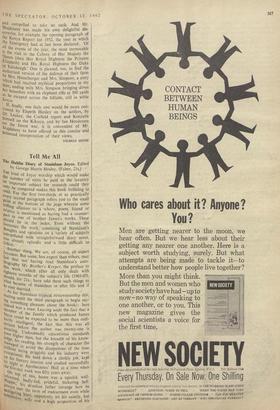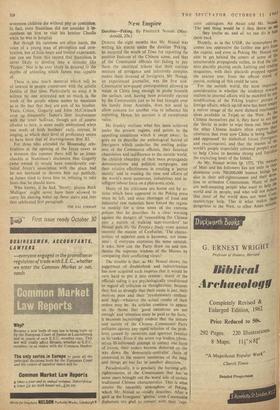Tell Me All
The Dublin Diary of Stanislaus Joyce. Edited by George Harris Healey. (Faber, 21s.) THE kind of Joyce worship which would make the number of visits he paid to the lavatory an important subject for research could they only be computed makes this book irritating to read. For the first two-thirds or so practically every second paragraph refers you to the small Print at the bottom of the page wherein some trifling allusion to a whore, poem, friend or relative is mentioned as having had a counter- Part in one of brother James's works. These should be in the index. Even without the footnotes the work, consisting of Stanislaus's !noughts and opinions on a variety of subjects alterPolated with straightforward diary notes, Was already episodic and a little difficult to follow, Another thing. We are, of course, all expert '1,13Yeeans. But some, less expert than others, may, the.el that not having read Stanislaus's auto- graPhy My Brother's Keeper, the preface to `u,ls work, which after all only deals with selghteen months of the subject's life (1903-05), ‘,11,°Ind, for 21s., have told them such things as 7nat became of Stanislaus in after life and if he ever married. w As for Stanislaus (typical reviewmanship this, ihaiting until the third paragraph to begin say- gi something pleasant about the book): here eed was a man. Leaving aside the fact that a infinber of the family which produced James flee could be expected to be more than ordi- narily a, intelligent, the fact that this was all m:ten before the author was twenty-one is wering. Undoubtedly educational standards ied higher then, but the breadth of his know- niagne, bis reading, his strength of character (he Withaged to avoid the dissipations of the time es..eout being priggish) and his industry were ^ehptional.
Up He held down a clerkly job, kept b, literary interest and studied successfully
Tght at Apothecaries' Hall at a time when .111nVe-clay week was fifty years away. infor top of this, home was a squalid, .well- vpa,, rn. ed, badly-fed, prideful, bickering hell. kiw,Ple, his drunken father (strange how he eastqiYs uses the term of endearment even while lubni2-ati:ng him), apparently let his saintly, but Isstve, wife and a high proportion of his seventeen children die without pity or contrition. In fact, even Stanislaus did not consider it in- cumbent on him to visit his brother Charlie while he was in hospital.
But though his opinions are often harsh, the voice of a young man of perception and cere- bration, but of little heart and limited experience, one can see from this record that Stanislaus is never likely to develop into a monster like 'Pappie.' Nor is he ever likely to descend to the depths of unfeeling which James was capable of.
There is also much material which will be of interest to people conversant with the artistic Dublin of that time. Particularly so since it is written by one interested not so much in the work of the people whose names he mentions as in the fact that they are pals of his brother. Yeats, Colum, Gogarty and John McCormack crop up frequently. James's later involvement with the tenor Sullivan, though not of course alluded to here, is more easily understood when one reads of both brothers' early interest in singing, at which their level of proficiency seems to have been that of drawing-room first XI.
For those who attended the Bloomsday cele- brations at the opening of the Joyce tower as a museum this summer there will be an ironic chuckle at Stanislaus's disclosure that Gogarty (who owned it) would have considerably cur- tailed Joyce's association with the place had he not hesitated to thrown him out publicly, as James tried to force him to, refusing to take hints that he should leave.
Who knows, if he had, 'Stately, plump Buck Mulligan' might never have been allowed to carry his shaving water up those stairs and into that celebrated first paragraph.
TIM PAT COOGAN







































 Previous page
Previous page